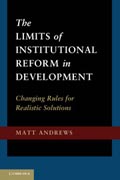
The Limits of Institutional Reform in Development: Changing Rules for Realistic Solutions
Andrews, Matt
Developing countries commonly adopt reforms to improve their governments yet they usually fail to produce more functional and effective governments. Andrews argues that reforms often fail to make governments better because they are introduced as signals to gain short-term support. These signals introduce unrealistic best practices that do not fit developing country contexts and are not considered relevant by implementing agents. The result is a set of new forms that do not function. However, there are realistic solutions emerging from institutional reforms in some developing countries. Lessons from these experiences suggest that reform limits, although challenging to adopt, can be overcome by focusing change on problem solving through an incremental process that involves multiple agents. INDICE: Preface; 1. Change rules, change governments, and develop?; 2. Deconstructing the puzzling evidence of reform; 3. Overlooking the change context; 4. Reforms as overspecified and oversimplified solutions; 5. Limited engagement, limited change; 6. What you see is not what you get (expecting limits); 7. Problem-driven learning sparks institutional change; 8. Finding and fitting solutions that work; 9. Broad engagement, broader (and deeper) change; 10. Reforming rules of the development game itself.
- ISBN: 978-1-107-01633-0
- Editorial: Cambridge University Press
- Encuadernacion: Cartoné
- Páginas: 268
- Fecha Publicación: 11/02/2013
- Nº Volúmenes: 1
- Idioma: Inglés
